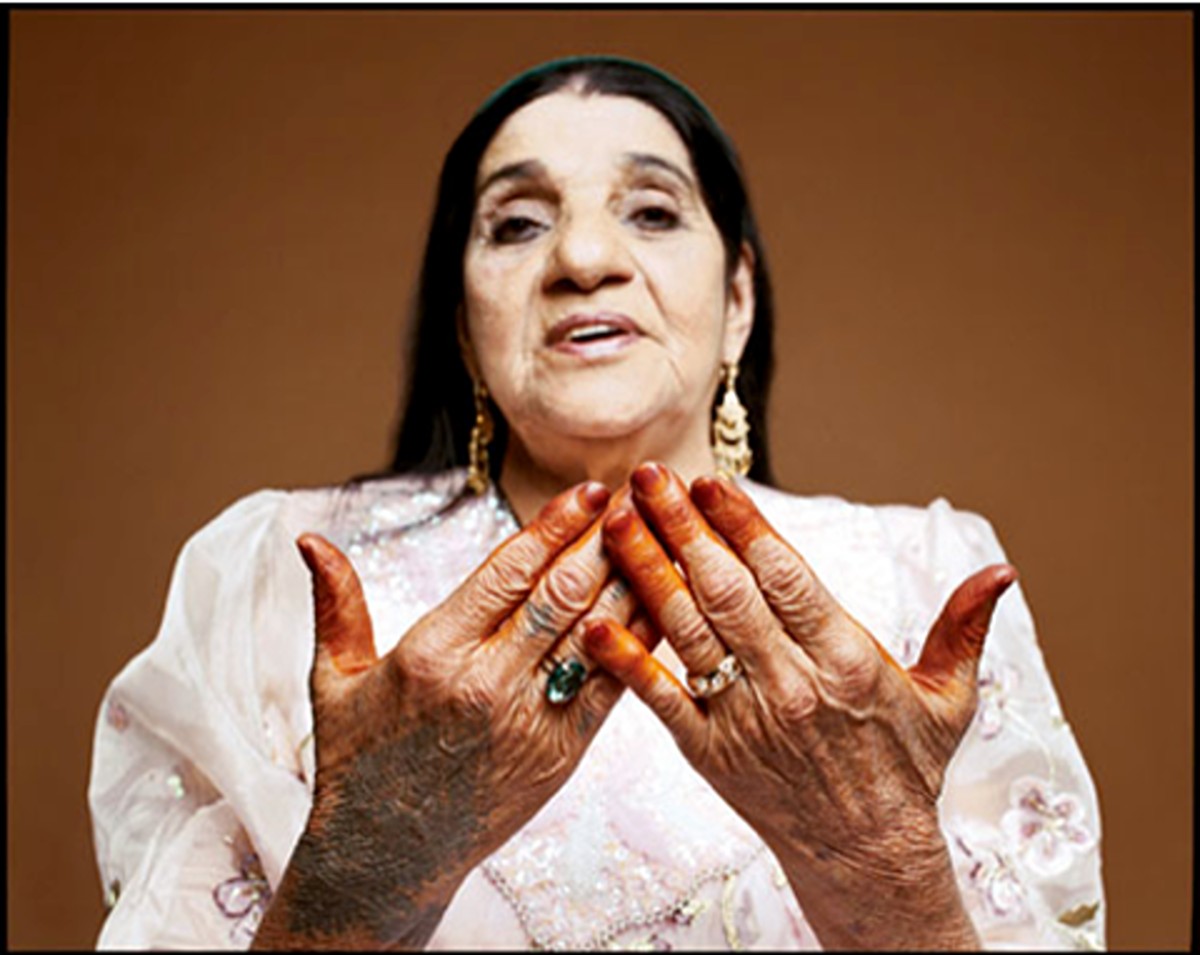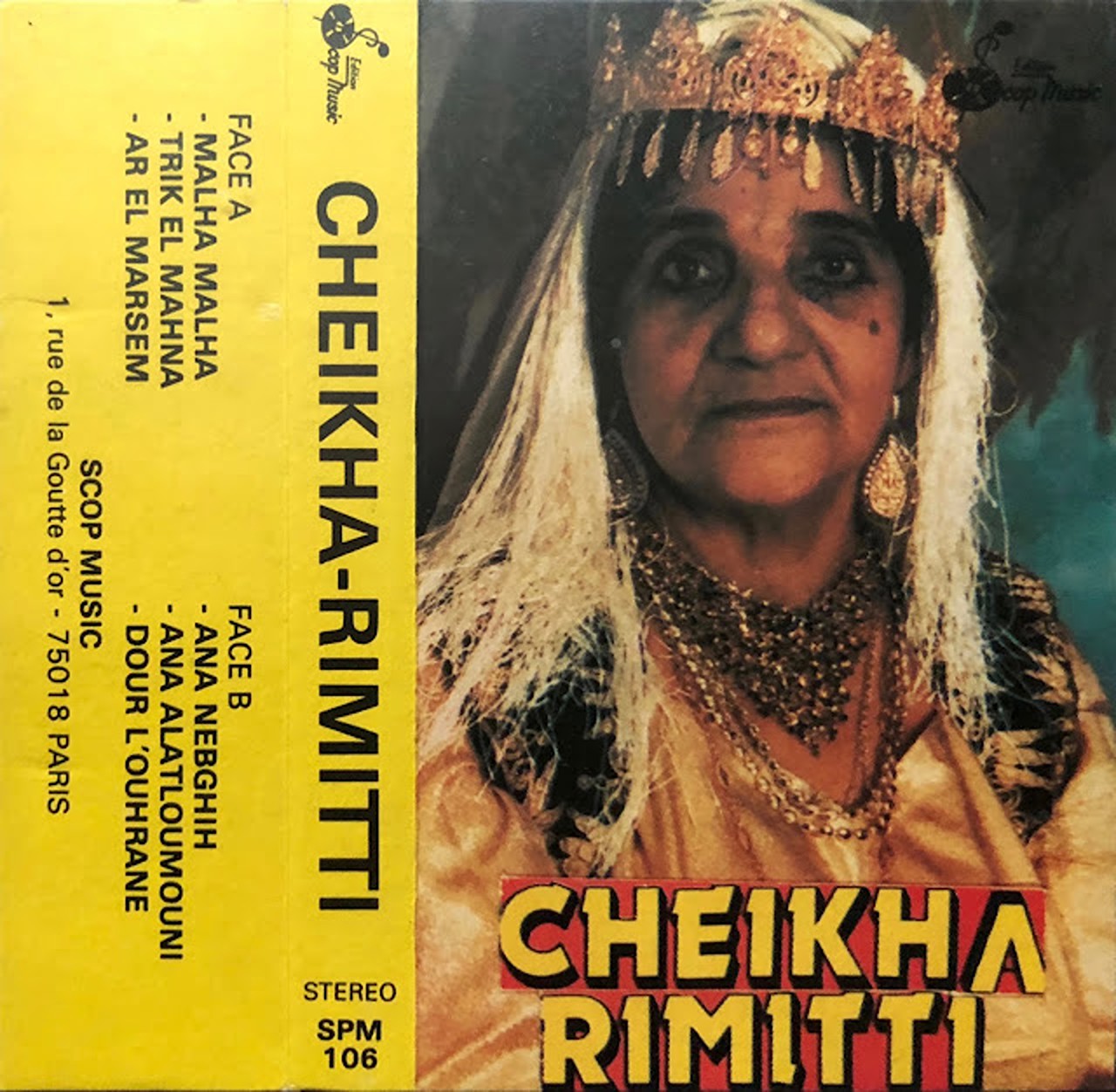She was first named Saadia, meaning “the happy one” in Arabic. Then she became known as Cheikha Remitti, a title in Algeria often used for women seen as defiant and sexually rebellious. Later, she was called Oum Raï, the Mother of Raï, and then, almost paradoxically, Hadja, a name reserved for women who are pious and religious.
Cheikha Remitti, the legendary Algerian raï singer, was a woman of many identities, many lives, and many voices. Yet at her core, she was always the girl from a small, humble village in Western Algeria. She carried her hometown with her, wherever she traveled, always seen in traditional Bedouin Algerian dresses, adorned with gold jewelry and henna staining both palms.
She was a woman who could be unapologetically sexually expressive, yet deeply rooted in local traditions, all while being introspective and poetic in her lyrics. For her, being a woman was never a role shaped by society. Womanhood, to her, was her own story, her own evolving journey, shifting and turning in ways only she could define.
Born in 1923, Rimitti was orphaned at a young age and forced into child labor to survive, performing at weddings and local celebrations to make ends meet. “Misery was like a school for me,” she once said in a 2001 interview with Afropop Worldwide. “It taught me my trade.”
It was misery that stayed with her throughout her childhood, and it was also misery that helped her survive it. It taught her lessons even in the moments she thought it might break her. It gave her purpose — her love for poetry and music, which would eventually lead her to write more than 300 songs — at a time when she believed she had none at all.
When the topic of Arab or North African women artists expressing sensuality or sexual desire arises, the figures most readily mentioned are often mainstream pop icons such as Haifa Wehbe or Ruby, whose performances were deliberately provocative and visually driven. Cheikha Remitti, however, exists in an entirely different space.
Her songs did not come from a need to perform for the male gaze, but rather, they came from within. They were grounded in the lived experiences of working-class women, whose expressions of sexuality were often met with judgment and moral scrutiny. The lyrics were also shaped by the female voices she encountered in intimate, women-only spaces, such as henna ceremonies, weddings, and public hammams, which were places where women could speak freely about marriage, motherhood, and the layered realities of femininity.
Coming from a working-class background, Rimitti once recounted how she used to walk barefoot through the streets, a symbol of the extreme poverty that defined her childhood. For her, singing began as a way to survive. It became the path through which she explored to navigate, and later articulate, the complex realities of being a working-class woman, and more so, a woman navigating life under colonial rule in Algeria.
As Rimitti grew older, she became increasingly aware of the struggles faced by working-class women, and of how class-based stereotypes shape and restrict a woman’s identity, reducing her to what society decides she should be. While middle-class women who speak openly about sexuality might be praised as empowered or sex-positive, a working-class woman doing the same is often met with judgment, labeled as improper or promiscuous.
In her teenage years, Rimitti experienced this double standard firsthand. She was quickly cast as a provocative dancer, known for balancing trays of glasses on her head while moving her hips during her performances in Algeria’s countryside. That label followed her, making it difficult for her to be seen as a respectable artist or singer. The weight of that judgment boxed her into a narrow role, one that ignored the many layers of her identity as a woman.
It was with the release of her first single, Charrak Gatta (Tear, Lacerate, 1954), that Rimitti began to carve out her own space as a female singer capable of holding many identities at once. She gave voice to the sexual desires of working-class women in a way that felt true to their lived experiences, not shaped by classist stereotypes, but grounded in authenticity, complexity, and truth. “I sang the life I had seen, my own history,” Rimitti once said.
While the full, word-for-word lyrics are difficult to trace, having been passed down orally and sung in a blend of French and Bedouin dialects, the song includes lines like “tear the cloth, let’s caress under the covers” a metaphor for the loss of virginity, and “he scratched my back so I gave him my all.” Rimitti was making it known that working-class women, too, have their own version of femininity; one that does not conform to society’s standards, but is shaped by their own lives, desires, and ways of being.
While European writers often painted her as anti-Muslim or pro-Western, this portrayal was misleading. In truth, Rimitti was giving voice to a tradition that already existed, as there were songs and stories shared by Algerian Bedouin women in private spaces like weddings and henna ceremonies.
The only difference was that these women performed behind closed doors, while Rimitti brought those same expressions into the public eye. By doing so, she gave voice to the full range of working-class women’s experiences, from hardship and heartbreak to love and sexual desire.
As French-Algerian cultural entrepreneur Sofiane Si Merabet puts it, “Remitti broke the glass ceiling by going public with the ailments and desires of the poor. No one had done this before.”
With her husky, deep voice, the moment she begins to sing, it is as if her voice alone takes up all the space in the room, more commanding than even the traditional instruments that accompany her, like the gasba (a long reed flute) and the guellal (a goblet-shaped drum). The sheer force of her vocals evokes the same intensity found in Egyptian icon Umm Kulthum.
But while Umm Kulthum’s power often lay in her refined, poetic odes to love, Rimitti rooted her music in the raw realities of working-class life, drawing from her own experience performing at private gatherings where exploring sensuality was not only accepted, but expected.
In one of her most iconic songs, Nouar (2000), which means “flowers” in Algerian dialect, Rimitti channels desire and sensuality through a hypnotic, chant-like chorus that lingers like a spell. The lyrics open with the image of Rimitti and her lover gathering flowers in the mountains, a setting that subtly hints at a moment of sensuality and intimacy.
Elsewhere in the song, she hints at open relationships, singing, “my darling lit me like he lights a cigarette, so many rumors since I was seen going up with him, unfortunately, two men desire me.”
Positioning women as the center of desire, Rimitti played cleverly with language, layering sensuality with subtle power. She flips the script by comparing herself to a cigarette, placing the woman in control of both the metaphor and the moment. Rather than being tied to a single man, Rimitti is desired by two, navigating love as something intentional and self-directed.
Desire, in her hands, becomes something a woman claims and expresses.
Later in her life, as raï music began gaining broader acceptance, Rimitti was no longer seen solely as the provocative singer who dared to voice desire and sensuality. She is now also known as the ‘Mother of Raï’ and a ‘Hadja’, having completed the pilgrimage to Mecca in 1976 and embracing a more ascetic way of living.
Rimitti held many identities at once — provocative and pious, bold and introspective. But perhaps the most powerful part of her legacy is how she defied the binary so often imposed on women artists: that one must either be a respectable figure or an object of male desire.
She was neither and both, a woman with thoughts, wants, and convictions, and she expressed them all with unflinching honesty.








Comments (0)